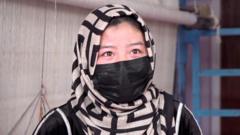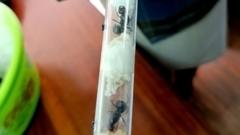In Kenya, a growing trend among women is reshaping views on motherhood, as many are opting for sterilisation procedures, such as tubal ligation, to embrace a child-free life. One such individual, Nelly Naisula Sironka, shares her journey of empowerment after undergoing the procedure, while many others, including online entrepreneurs, are speaking out about their choices. This shift reflects a significant societal change as women increasingly challenge expectations about motherhood and the roles they are meant to play in society.
Kenyans Embrace Child-Free Choices: A Shift Towards Sterilisation

Kenyans Embrace Child-Free Choices: A Shift Towards Sterilisation
An increasing number of Kenyan women are choosing sterilisation over motherhood, challenging traditional societal norms.
In a path less traveled, 28-year-old Nelly Naisula Sironka stands firm in her decision to forego motherhood entirely. Last October, she took the definitive step to undergo tubal ligation, a sterilisation procedure that prevents future pregnancies and affirms her autonomy over her own body. "I feel liberated," she expressed, highlighting the newfound control over her life's direction.
Kenya's health ministry reported that from 2020 to 2023, approximately 16,000 women opted for tubal ligation. While there's no clear data on how many were childless prior to the procedure, the landscape of sterilisation candidates has evolved. Dr. Nelly Bosire, a Nairobi-based gynaecologist, notes that more women with fewer children are now seeking sterilisation, contrasted with the traditional candidates who were typically mothers of multiple children.
The decision for many, like Sironka, comes down to a personal choice influenced not just by their own experiences but also by broader societal shifts. Sironka found inspiration in feminist literature and her father's encouragement to prioritize education, which ultimately helped her recognize the validity of a child-free life. The operation cost her 30,000 Kenyan shillings (approximately £190 or $230) and was described by her as a necessity driven by her growing fears of deteriorating women’s rights globally.
Another notable voice comes from Muthoni Gitau, a YouTuber and interior designer. Her own sterilisation journey, which she documented in a candid 30-minute video, began when she was just 10 years old and clear about her desire not to have children. Her experience included a frustrating initial interaction with a dismissive doctor that put off her decision for over a decade. Ultimately, when she was able to find a compassionate physician willing to assist her without judgement, she finally took that step for herself.
Dr. Bosire emphasizes the need for medical professionals in Kenya to adjust their mindsets about women's reproductive choices, as societal pressure often dictates beliefs about motherhood. The narrative surrounding sterilisation is, however, still contentious in many medical circles. As attitudes shift and more women like Sironka and Gitau vocalize their decisions and experiences, a new conversation about women’s rights and autonomy is beginning to take shape, embracing the idea that fulfillment can exist outside traditional family structures.
Kenyan women are increasingly vocal about their choice not to have children and are advocating for the right to make their own reproductive decisions. With many of them sharing their journeys through social media, there is an emerging sense of community and support around these decisions, showcasing a cultural shift towards embracing diverse life paths beyond motherhood.
Kenya's health ministry reported that from 2020 to 2023, approximately 16,000 women opted for tubal ligation. While there's no clear data on how many were childless prior to the procedure, the landscape of sterilisation candidates has evolved. Dr. Nelly Bosire, a Nairobi-based gynaecologist, notes that more women with fewer children are now seeking sterilisation, contrasted with the traditional candidates who were typically mothers of multiple children.
The decision for many, like Sironka, comes down to a personal choice influenced not just by their own experiences but also by broader societal shifts. Sironka found inspiration in feminist literature and her father's encouragement to prioritize education, which ultimately helped her recognize the validity of a child-free life. The operation cost her 30,000 Kenyan shillings (approximately £190 or $230) and was described by her as a necessity driven by her growing fears of deteriorating women’s rights globally.
Another notable voice comes from Muthoni Gitau, a YouTuber and interior designer. Her own sterilisation journey, which she documented in a candid 30-minute video, began when she was just 10 years old and clear about her desire not to have children. Her experience included a frustrating initial interaction with a dismissive doctor that put off her decision for over a decade. Ultimately, when she was able to find a compassionate physician willing to assist her without judgement, she finally took that step for herself.
Dr. Bosire emphasizes the need for medical professionals in Kenya to adjust their mindsets about women's reproductive choices, as societal pressure often dictates beliefs about motherhood. The narrative surrounding sterilisation is, however, still contentious in many medical circles. As attitudes shift and more women like Sironka and Gitau vocalize their decisions and experiences, a new conversation about women’s rights and autonomy is beginning to take shape, embracing the idea that fulfillment can exist outside traditional family structures.
Kenyan women are increasingly vocal about their choice not to have children and are advocating for the right to make their own reproductive decisions. With many of them sharing their journeys through social media, there is an emerging sense of community and support around these decisions, showcasing a cultural shift towards embracing diverse life paths beyond motherhood.




















